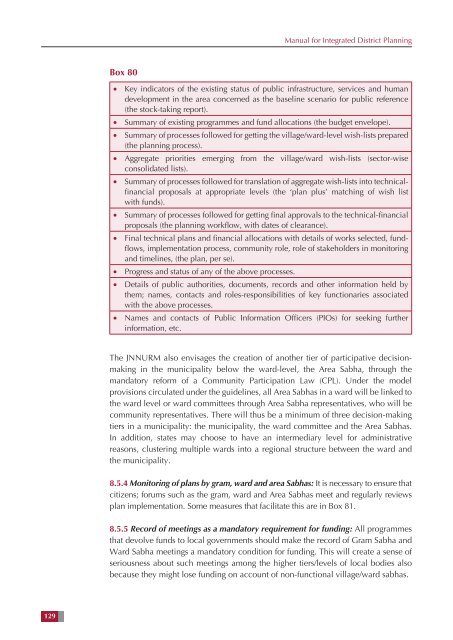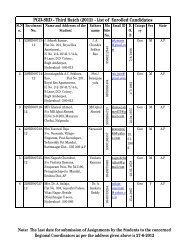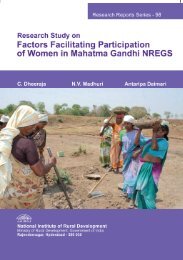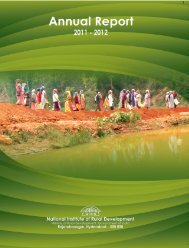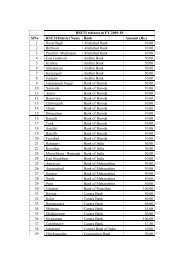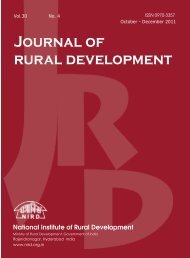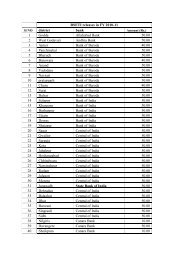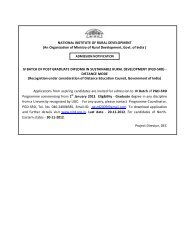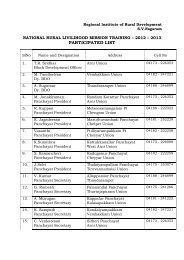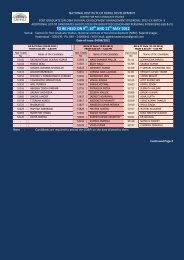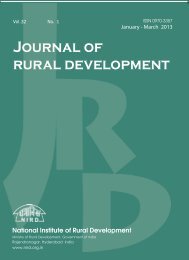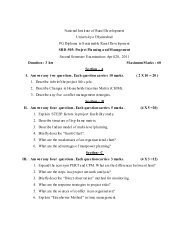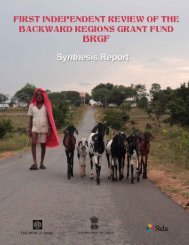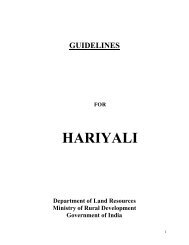Manual for Integrated District Planning - National Institute of Rural ...
Manual for Integrated District Planning - National Institute of Rural ...
Manual for Integrated District Planning - National Institute of Rural ...
You also want an ePaper? Increase the reach of your titles
YUMPU automatically turns print PDFs into web optimized ePapers that Google loves.
<strong>Manual</strong> <strong>for</strong> <strong>Integrated</strong> <strong>District</strong> <strong>Planning</strong><br />
Box 80<br />
• Key indicators <strong>of</strong> the existing status <strong>of</strong> public infrastructure, services and human<br />
development in the area concerned as the baseline scenario <strong>for</strong> public reference<br />
(the stock-taking report).<br />
• Summary <strong>of</strong> existing programmes and fund allocations (the budget envelope).<br />
• Summary <strong>of</strong> processes followed <strong>for</strong> getting the village/ward-level wish-lists prepared<br />
(the planning process).<br />
• Aggregate priorities emerging from the village/ward wish-lists (sector-wise<br />
consolidated lists).<br />
• Summary <strong>of</strong> processes followed <strong>for</strong> translation <strong>of</strong> aggregate wish-lists into technicalfinancial<br />
proposals at appropriate levels (the ‘plan plus’ matching <strong>of</strong> wish list<br />
with funds).<br />
• Summary <strong>of</strong> processes followed <strong>for</strong> getting final approvals to the technical-financial<br />
proposals (the planning workflow, with dates <strong>of</strong> clearance).<br />
• Final technical plans and financial allocations with details <strong>of</strong> works selected, fundflows,<br />
implementation process, community role, role <strong>of</strong> stakeholders in monitoring<br />
and timelines, (the plan, per se).<br />
• Progress and status <strong>of</strong> any <strong>of</strong> the above processes.<br />
• Details <strong>of</strong> public authorities, documents, records and other in<strong>for</strong>mation held by<br />
them; names, contacts and roles-responsibilities <strong>of</strong> key functionaries associated<br />
with the above processes.<br />
• Names and contacts <strong>of</strong> Public In<strong>for</strong>mation Officers (PIOs) <strong>for</strong> seeking further<br />
in<strong>for</strong>mation, etc.<br />
The JNNURM also envisages the creation <strong>of</strong> another tier <strong>of</strong> participative decisionmaking<br />
in the municipality below the ward-level, the Area Sabha, through the<br />
mandatory re<strong>for</strong>m <strong>of</strong> a Community Participation Law (CPL). Under the model<br />
provisions circulated under the guidelines, all Area Sabhas in a ward will be linked to<br />
the ward level or ward committees through Area Sabha representatives, who will be<br />
community representatives. There will thus be a minimum <strong>of</strong> three decision-making<br />
tiers in a municipality: the municipality, the ward committee and the Area Sabhas.<br />
In addition, states may choose to have an intermediary level <strong>for</strong> administrative<br />
reasons, clustering multiple wards into a regional structure between the ward and<br />
the municipality.<br />
8.5.4 Monitoring <strong>of</strong> plans by gram, ward and area Sabhas: It is necessary to ensure that<br />
citizens; <strong>for</strong>ums such as the gram, ward and Area Sabhas meet and regularly reviews<br />
plan implementation. Some measures that facilitate this are in Box 81.<br />
8.5.5 Record <strong>of</strong> meetings as a mandatory requirement <strong>for</strong> funding: All programmes<br />
that devolve funds to local governments should make the record <strong>of</strong> Gram Sabha and<br />
Ward Sabha meetings a mandatory condition <strong>for</strong> funding. This will create a sense <strong>of</strong><br />
seriousness about such meetings among the higher tiers/levels <strong>of</strong> local bodies also<br />
because they might lose funding on account <strong>of</strong> non-functional village/ward sabhas.<br />
129


